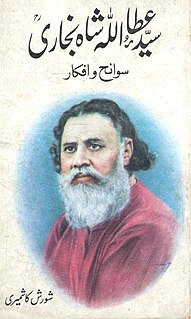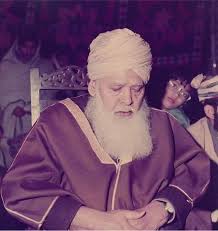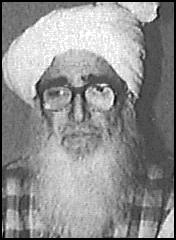Related Research Articles

The Darul Uloom Deoband is an Islamic university in India at which the Sunni Deobandi Islamic movement began. It is located in Deoband, a town in Saharanpur district, Uttar Pradesh. The school was founded in 1866 by Muhammad Qasim Nanautavi. Mahmud Deobandi was the first teacher and Mahmud Hasan Deobandi was the first student.

Syed Ata Ullah Shah Bukhari , was a Muslim Hanafi scholar, religious and political leader from the Indian subcontinent. He was one of the Majlis-e-Ahrar-e-Islam's founding members. His biographer, Agha Shorish Kashmiri, states that Bukhari's greatest contribution had been his germination of strong anti-British feelings among the Indian Muslims. He is one of the most notable leader of the Ahrar movement which was associated with opposition to Muhammad Ali Jinnah and opposition to the establishment of an independent Pakistan, as well as opposition to the Ahmadiyya Movement. He is considered as a legendary rhetoric, which made him famous among the Muslims.
Zain ad-Din, Abu al-Faraj, 'Abd ar-Rahman ibn Ahmad ibn 'Abd ar-Rahman ibn al-Hasan ibn Muhammad ibn Abi al-Barakat Mas'ud as-Sulami, al-Baghdadi, al-Hanbali, also known as Ibn Rajab, which was a nickname he inherited from his grandfather who was born in the month of Rajab, was a Muslim scholar.

Imam e Ehl-e-Sunnat
Darul Uloom Al-Arabiyyah Al-Islamiyyah, better known as Darul Uloom Bury, was established in 1973 and is the oldest Islamic seminary in the United Kingdom. Based on the Dars-e-Nizami syllabus found throughout the world, it was founded by Yusuf Motala.
The Naqvi sadah are people with the last name "Naqvi" who are direct descendants of the Islamic prophet Muhammad through the lineage of the Imam Ali al-Naqi. Ali Naqi was the 10th Twelver Shi'a imam and direct descendant of the daughter of Muhammad, Fatimah and her husband Ali, the first Shi'a imam, believed by them to be the successor of the Muhammad. Some Naqvis trace their ancestry back to Ali al-Naqi through his sons Ja'far al-Sani and Husain ul Asghar while others trace it through his other sons. Other people in South Asia with the surname Bokhari claim the same descent.
Muhammad Qasim Nanautavi was an Indian Sunni Hanafi Maturidi Islamic Scholar, theologian and a Sufi who was one of the main founders of the Deobandi Movement, starting from the Darul Uloom Deoband. He is known with the title of Hujjat al-Islam among his followers.

Syed Safdar Hussain Najafi was a scholar and religious leader.

Syed Shuja’at Ali Qadri was the first Grand Mufti of Pakistan, Judge of Federal Shariat Court, a member of the Pakistani Council of Islamic Ideology and a scholar of Islamic Sciences and modern science. He was influenced by Mustafa Raza Khan Qadri.
Majlis-e Ahrar-e Islam, also known in short as Ahrar, is a religious Muslim political party in the Indian subcontinent that was formed during the British Raj on 29 December 1929 at Lahore.

Abdul Haq of Akora Khattak, sometimes referred to as Abdul Haq Akorwi was a Pakistani Islamic scholar and the founder, chancellor, and Shaykh al-Hadith of the Islamic seminary Darul Uloom Haqqania. He was involved in politics as a member of the political party Jamiat Ulema-e-Islam. He served three times in the National Assembly of Pakistan and was an active proponent of the Khatme Nabuwwat movement.
Syed Abuzar Bukhari was a Muslim Pakistani scholar,Intellectual, orator, poet, writer, and a former president of Majlis-e-Ahrar-e-Islam. He was a prominent figure of the freedom movement of undivided India. Bukhari was the elder son of Syed Ata Ullah Shah Bukhari and was a leader of Majlis-e-Ahrar-e-Islam being elected multiple times as a President or Secretary General of the Ahrar Party. Bukhari was also founder of Majlis-e-Khuddam-e-sahabah and had an important role in Tehreek-e-Khatme Nabuwwat 1953, 1974 and 1984.
Syed Ata-ul-Mohsin Bukhari was the son of Syed Ata Ullah Shah Bukhari. He was a leader of Majlis-e-Ahrar-e-Islam.
Muhammad Tayyib Qasmi was an Indian Sunni Islamic scholar who served as Vice Chancellor of Darul Uloom Deoband for more than half a century. He was grandson of Muhammad Qasim Nanautavi, the founder of the Darul Uloom Deoband.
Abdul Haq Azmi was an Indian Sunni Islamic scholar. He was former Shaykh al-Hadith of the Darul Uloom Deoband. He is also known as Shaykh Saani by his followers.
Saleemullah Khan was a Pakistani Islamic scholar and former President of Wifaq ul Madaris Al-Arabia, Pakistan. His students include Muhammad Rafi Usmani and Muhammad Taqi Usmani. Khan established Jamia Farooqia in Karachi in 1967.
Noor Alam Khalil Amini is an Indian Sunni Muslim scholar and senior professor of Arabic language and literature at Darul Uloom Deoband. His book Falastin Fi Intezari Salahidin was subject of a doctoral study at Assam University and his book Miftahul Arabia is part of dars-e-nizami curricula in various madrasas.
Aziz-ul-Rahman Usmani was an Indian Sunni Muslim scholar who served as first Grand Mufti of Darul Uloom Deoband. He is best known for his Fatawa Darul Uloom Deoband. His brother was Shabbir Ahmad Usmani.
References
- ↑ Al Ashaab Fil Kitaab. Multan: Darul Tasneef Wal Ashaat Qadeer Abbad Multan. 1956. p. 532.
- ↑ "Touheed Aur Shirk Ki Haqeeqat, Maulana Noor Ul Hasan Bukhari Rehmaullha".
- ↑ Masaib u Sahaba. Multan: Darul Tasneef wal Ashaat 1019 Qadeer Abbad Multan.